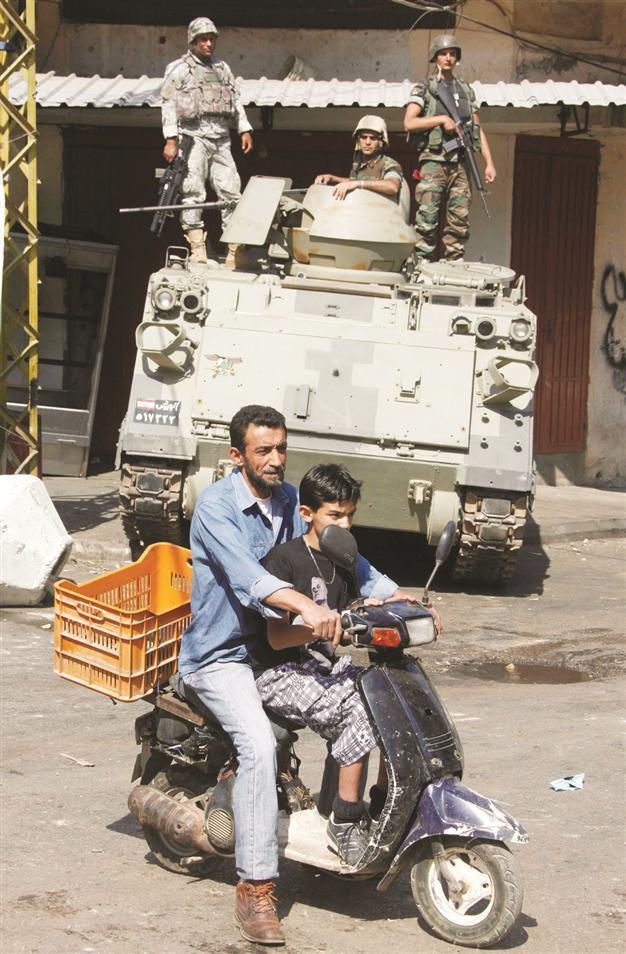Violence in Syria could spread: PM
ANKARA - Hürriyet Daily News

A man and a boy ride a scooter past Lebanese soldiers on their armored vehicle deployed at a street near the Bab al-Tebbaneh neighborhood in Tripoli. REUTERS photo
Turkey’s prime minister has urged regional countries and the international community not to see the violence in Syria as rooted in sectarian differences, but as a crisis of humanity. The fire in Syria could easily spread to regional countries, as it has in Lebanon, Recep Tayyip Erdoğan also warned.“Assessing issues from the ideological perspective of sectarian or ethnic roots would be a huge mistake. This sort of approach adds fuel to the flames and, God forbid, turns the spark in the region into a devastating fire,” Erdoğan said in his weekly address to the Justice and Development Party (AKP) parliamentary group yesterday. “It’s wrong to assess the crisis in Syria as a sectarian clash. This can lead those who make this evaluation in the wrong direction.”
Erdoğan’s warning came only a day after sectarian fights between Alawite supporters of Syrian President Bashar al-Assad and Sunni Muslims in Lebanon’s Tripoli have intensified. Lebanon has long been the theater of such sectarian clashes, which have lead to deep instability over the years.
“Those who have humanity and mercy in their hearts should look at the Syrian issue from the angle of humanity, heart and conscience, rather than from the angle of sectarianism. I say this to all countries in the region,” he said, tacitly referring to Iran’s role in the Syrian turmoil. Turkey believes that Iran, the region’s Shiite heavyweight, has its hands in the Syrian crisis and is backing the al-Assad regime in order to protect its own interests in the region.
Issuing similar warnings to his political opponents in Turkey, Erdoğan said: “Those who look at Syria through the lens of being pro- or anti- a certain sect will fail the test of humanity.”
Criticism to CHP
Underlining that the violence had not ended in Syria, despite Damascus saying it would implement the peace plan outlined by former U.N. Secretary General Kofi Annan, Erdoğan said it was impossible to approve the suicide bombing that had killed dozens in the country so far. “Whoever perpetrated it, it’s wrong. We have already stated that we have denounced it,” he said.
Defending Foreign Minister Ahmet Davutoğlu’s much-criticized “zero-problems-with-neighbors-policy,” Erdoğan said the approach was never intended to ignore regional leaders who attack and commit brutal crimes against their own people. “They have misunderstood about this zero problem policy. They considered this impassivity and opportunism, just as they did for years,” he said, referring to the main opposition Republican People’s Party (CHP).
Criticizing CHP leader Kemal Kılıçdaroğlu for backing the al-Assad regime, implying that he was only doing so because of his Alawite identity, Erdoğan called on Kılıçdaroğlu to freely express his opinions on Syria. “Do not hesitate. This is a free country. Express openly whatever you have in mind.”
Erdoğan argued that the CHP had no visionary outlook in foreign policy and that earlier CHP governments had turned their backs to Arabs and Muslims, even humiliating them by naming their dogs “Arab.”
In response to Erdoğan’s criticisms, the CHP leader said Erdoğan had become the tool of global powers, particularly in the cases of Libya and Syria. “Those who become the pawn of other countries can of course not understand our foreign policy vision,” he said.
















